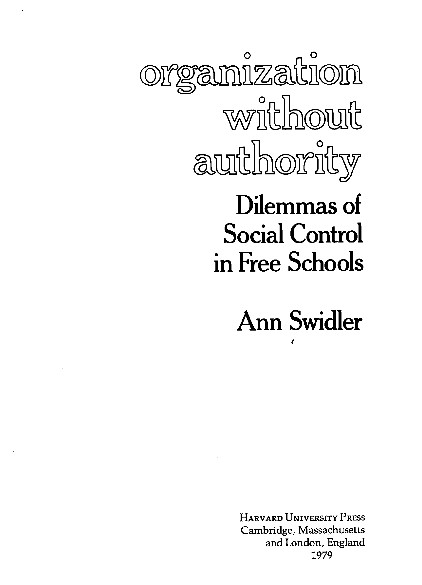Ann Swidler: Organization without Authority: Dilemmas of Social Control in Free Schools (1979)
Filed under book | Tags: · 1960s, 1970s, counterculture, education, organization

“This is a study of alternative organizations–the free schools, communes, and collectives that grew out of the radical and political movements of the 1960s. The drama of that decade, reverberating into the 1970s and beyond, was significant for American culture and American organizational life. Yet we are still puzzled by the changes the sixties brought. This book speaks to that puzzlement, offering a systematic analysis of the characteristic organizations produced by the sixties–organizations that rejected hierarchy and authority in the attempt to devise more liberating forms of human cooperation.” (from the Preface)
Publisher Harvard University Press, 1979
ISBN 0674643402, 9780674643406
199 pages
PDF (no OCR)
Comment (0)Anne Burdick, Johanna Drucker, Peter Lunenfeld, Todd Presner, Jeffrey Schnapp: Digital_Humanities (2012)
Filed under book | Tags: · data mining, data visualisation, digital humanities, education, linguistics, simulation

“Digital_Humanities is a compact, game-changing report on the state of contemporary knowledge production. Answering the question, “What is digital humanities?,” it provides an in-depth examination of an emerging field. This collaboratively authored and visually compelling volume explores methodologies and techniques unfamiliar to traditional modes of humanistic inquiry–including geospatial analysis, data mining, corpus linguistics, visualization, and simulation–to show their relevance for contemporary culture.
Included are chapters on the basics, on emerging methods and genres, and on the social life of the digital humanities, along with “case studies,” “provocations,” and “advisories.” These persuasively crafted interventions offer a descriptive toolkit for anyone involved in the design, production, oversight, and review of digital projects. The authors argue that the digital humanities offers a revitalization of the liberal arts tradition in the electronically inflected, design-driven, multimedia language of the twenty-first century.
Written by five leading practitioner-theorists whose varied backgrounds embody the intellectual and creative diversity of the field, Digital_Humanities is a vision statement for the future, an invitation to engage, and a critical tool for understanding the shape of new scholarship.”
Publisher MIT Press, 2012
Open Access
ISBN 0262018470, 9780262018470
x+141 pages
Jeffrey R. Di Leo, Uppinder Mehan (eds.): Terror, Theory and the Humanities (2012)
Filed under book | Tags: · aesthetics, education, film, philosophy, terrorism, theory, war on terror

The events of September 11, 2001, have had a strong impact on theory and the humanities. They call for a new philosophy, as the old philosophy is inadequate to account for them. They also call for reflection on theory, philosophy, and the humanities in general. While the recent location and killing of Osama bin Laden, the leader of al-Qaeda, in Pakistan on May 2, 2011—almost ten years after he and his confederates carried out the 9/11 attacks—may have ended the “war on terror,” it has not ended the journey to understand what it means to be a theorist in the age of phobos nor the effort to create a new philosophy that measures up with life in the new millennium. It is in the spirit of hope—the hope that theory will help us to understand the age of terror—that the essays in this collection are presented.
With essays by Christian Moraru, Terry Caesar, David B. Downing, Horace L. Fairlamb, Emory Elliott, Elaine Martin, Robin Truth Goodman, Sophia A. McClennen, William V. Spanos, Zahi Zalloua.
Publisher Open Humanities Press, an imprint of MPublishing, University of Michigan Library, Ann Arbor
Critical Climate Change series
Creative Commons Attribution Share Alike 3.0 License
ISBN 1607852497, 9781607852490
248 pages
PDF
View online (HTML)

